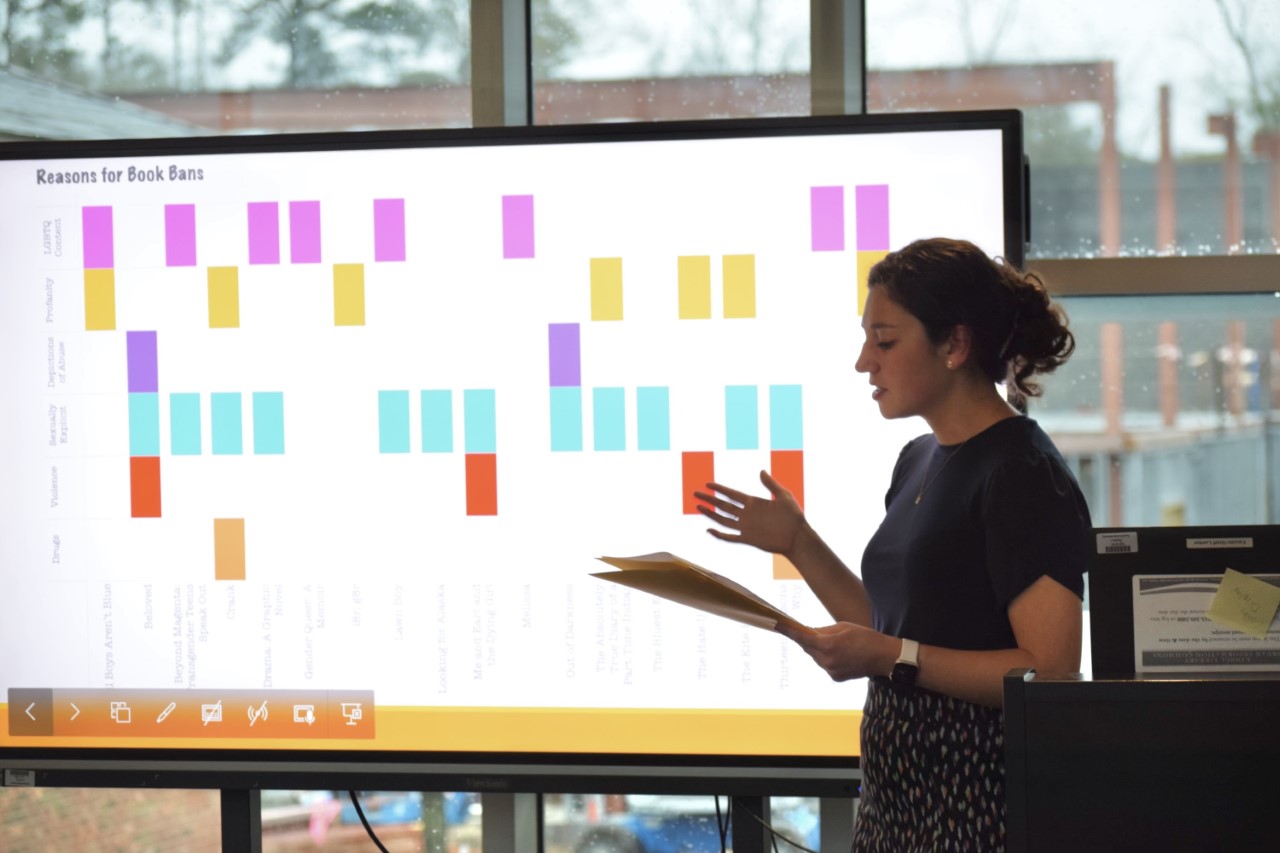- What is your area of specialty?
I specialize in 20th and 21st century literature and the history (and futures!) of psychotherapy; intersectional feminist theories and pedagogies in the field of digital humanities (DH); and synthesizing computational text analysis (or distant reading) with formal analysis (close reading). In Digital Culture and Design, I am privileged to teach methods of ethical data collection and visualization as social justice tools; critical making interdisciplinary digital projects about pressing social issues like climate change and mental health; and digital resources, from archives to artificial intelligence, as tools for big, real-world humanities questions.
- What was the title of your master’s thesis or dissertation?
My dissertation, The Therapeutic Encounter, is about the different shapes taken by the relationship between patient and therapist over the course of the 20st century and into the 21st: from the formal, embodied structures of Freudian psychoanalysis in the 1930s to the pervasiveness of virtual and automated modalities in the 2020s. I write in particular about how women and other marginalized patients, some well-known literary authors and other lesser-known individuals, use writing while in therapy as a tool to work through their relationships to gender, sexuality, race, and other aspects of minoritization. I see writing—often prescribed by the therapist—as a process of self-definition and self-transcendence that authorizes each individual to become the self she is, not the self others expect her to be. But I also look at the other side of writing, reading, to show how reading literature can feel like being in therapy because it helps us appreciate the conflicts and opportunities for growth that arise when we discover we do not know ourselves as well as we tend to think we do.
3. What is your current scholarly project?
I’m working on my next book project, The Us Generation: Mental Health and Social Justice. I’m interested in how mental health is “marketed” to Generation Z in narrative forms that might be more accessible than therapy itself: young adult (YA) novels, podcasts, television, and social media posts. I’m reading narratives across media forms, from Adib Khorram’s 2018 YA novel Darius the Great Is Not Okay to the recently revivified HBO series In Treatment (2021) in which a Black female therapist treats a diverse set of patients navigating racial reckoning and cancel culture, inequity and disability, all amidst the ongoing global pandemic. I’m also distant reading a large corpus of Gen Z discourse on the Internet, using computational tools such as word embedding models to show how this generation thinks through the tension between caring for the self and caring for the collective. I’m finding that, while this may have seemed paradoxical to previous generations, Gen Z uses therapeutic vocabulary and concepts to advocate for social justice movements such as #MeToo, Black Lives Matter, and Fridays for Future.
- What and where was your previous position?
I earned my PhD in English and Graduate Certificate in Digital Humanities from Stanford University in California in 2022. I was a Project Manager for the feminist DH project The Modernist Archives Publishing Project and a Core Research Member of the Stanford Literary Lab, a research collective that uses computational tools to study literature and culture. Before that, I was an undergraduate double-major in English and Spanish (and also learned French!) at Duke University in North Carolina.
- What is your favorite assignment to assign?
This is a tough one! I’m currently jazzed about the hybrid collaborative/individual project my students and I are working on in my DCD 300: Special Topics in Digital Studies course on Banned Books from a Digital Perspective. We’re collectively writing and creating data visualizations about who book banning disproportionately affects on a national level. Each of us is also writing and researching an individual “case study” of any banned book we choose, from children’s to young adult to adult to poetry. I want to empower us to use data-driven storytelling—from individual accounts of how reading helps us understand the complexities of identity to geographic regions most affected by book banning and related legislation—to speak out against the silencing of marginalized stories.
- What was the last book you read?
I’m the kind of person who reads several books at once! I am relishing Amy E. Elkins’s magnificent book Crafting Feminism from Literary Modernism to the Multimedia Present (Oxford University Press, 2023) and Stephanie Springgay’s Feltness: Research-Creation, Socially Engaged Art, and Affective Pedagogies (Duke University Press, 2022), both brilliant scholarly works that inspire me in their beauty of expression as I finesse my first book manuscript, The Therapeutic Encounter. I’m bolstered in my commitment to lived feminisms by Sara Ahmed’s Complaint! (Duke University Press, 2021), which is about complaint, particularly against gender-based violence, as feminist pedagogy. And I’m reading Maia Kobabe’s Gender Queer for the Banned Books Club organized by my colleagues, Dr. Ellen Arnold and Dr. Tabitha Lowery in English.
- What do you enjoy most about CCU so far?
I love working with my office door open in the Edwards College of Humanities and Fine Arts building because it’s such a vibrant space! From the Black Box Theater to the John Cage, the painting and ceramics studios to the FabLab, the Digital Production Studio to the Athenaeum Press, there is so much artistic vitality in our College. I feel energized by the collaborative spirit across Departments and the talent I’m lucky to be surrounded by every day.
